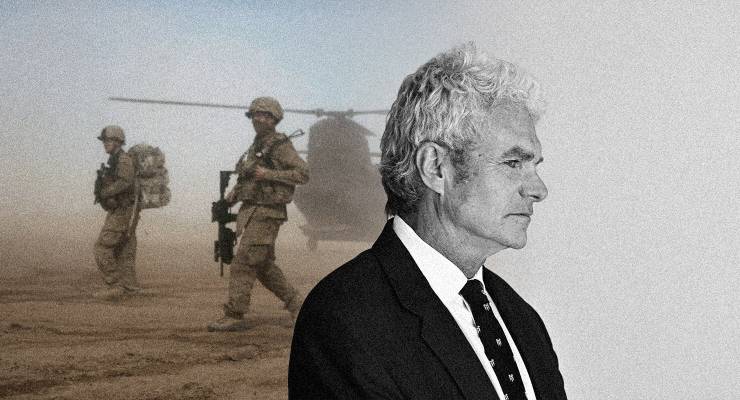
On Friday, whistleblower David McBride pleaded guilty to leaking classified information to the media. The guilty plea for three charges came after Judge David Mossop’s rejection of McBride’s defence — that members of the military have a duty to act in the “public interest”.
Without this defence, his lawyer advised that a not guilty plea would be difficult terrain. McBride’s counsel, Stephen Odgers SC, immediately sought to appeal to the ACT Supreme Court to have the trial stayed. But McBride was then dealt a second blow. Chief Justice Lucy McCallum declined his bid to hear the appeal, calling his argument “ambitious”, and refused to postpone the trial.
McBride provided information that formed the basis for a series of 2017 ABC reports titled “The Afghan Files”, exposing the war crimes of ADF special troops as they served alongside other NATO countries in Afghanistan. McBride’s disclosure gave the public a rare window into the fog of war, with all its hypocrisies and secrecy.
On Tuesday last week, Odgers told the judge that strictly obeying orders “ignored Nuremberg”. In light of global events, the reference was chilling. Odgers spoke of “higher” duties — ones to and of humanity. He echoed the words of Hannah Arendt, who sat in the Nuremberg trials and highlighted the banality of evil through “thoughtless conformity”.
The prosecution, however, laid its case around “duty” as one to the Crown, the ADF and the ultimate judgment of the sovereign. Conversely, it determined duty by its very bureaucratic adherence — as a legal rather than a moral obligation and, in essence, it won. Backed into a corner with no clear way out, McBride pleaded guilty.
As he put his head in his hands, the loss seemed twofold — it was within the shortcomings of the Public Interest Disclosure Act and the cloak of safeguarding “national sovereignty”, emphasised by eight “classified documents” McBride sought as trial evidence. After the documents were assessed in a closed court under national security information (NSI) protection, they were dismissed to avoid risks to “intelligence ties”.
Given that “The Afghan Files” are already public knowledge, how these documents posed any direct threat to national security is not clear. What was clear was that if our civil rights and/or access to information can be eroded with one mention of “national security”, it cuts to the core of how statehood and democracy function in an international system.
While prosecutors in the pre-trial asserted that “public interest” was “nebulous”, the abstract nature of “national security” went unchallenged, raising questions about the relationship between imperial powers and medium powers, and how Australia’s war crimes were (and are) muted by its unwavering friendship to America and vice versa.
Take for instance the public statements made by the Australian government that “enough is enough” in relation to the detention of WikiLeaks founder Julian Assange and his impending extradition to America, while simultaneously charging McBride for exposing war crimes in Afghanistan. This was a “war on terror” that in the first 20 years resulted in potentially as many as 48,308 civilian deaths, according to a 2021 estimate by Airwars, a UK-based airstrike monitoring group. It was a war Australia fought, at its core, to demonstrate Australia’s loyalty to the US — a devotion to an imperial legacy built on justifying civilian deaths through the language of “collateral damage”, from the banana wars to the forever wars.
This relationship is strengthened by the AUKUS deal. It could be argued that Assange, and at a lesser level McBride, demonstrate that Australia’s loyalty is first to its empire, not its citizens. A recent report by The Intercept revealed how Biden has censored the transparency of arms flow to Israel, but not to Ukraine. The size and specificity of Australia’s military exports to Israel are also shrouded in secrecy and vague language.
As the Israel Defense Force with (Biden’s persistent support) commits war crimes at a pace almost impossible to measure in real time, a rapid-pace dissolution with Western imperialism is cementing. Australians are taking to the streets in the largest anti-war protests since the Iraq War. Maritime unions are blocking the supply chains of arms to Israel, and the public is waking up to the violent reality of the military-industrial complex.
McBride’s case demonstrates how both the protection of whistleblowers and the transparency of military conduct are undeniably in the Australian public interest. The outcome of the trial may act as a catalyst for wider conversations about our place in the world, and with growing grassroots anger at the framing of Gaza by the liberal establishment, these conversations seem both urgent and inevitable.








Australian should be wary of having anything to do with AUKUS. Such interaction will leave you liable to charges and imprisonment under one of Australia’s 800 odd Security laws. This will also impact family and/or friends who may mention that you have been charged and/or imprisoned.
Too late, I’m afraid. Our so-called leaders are so enamoured with the venal USA war machine, that they give no consideration whatsoever to their duty to the Australian people. Australian democracy is an illusion and always has been.
I think LD meant to say ‘Australians’ as in each of us individually.
It’s good advice; not that I expect folks will have much choice, short of quitting their job.
Our 800, plus the US’s, plus the UK’s. Else how can Assange be in an English prison? And as far as I know he has never signed the Official Secrets Act or served in any of the forces. The actual spy in the case is now free and clear in the home of the free. Weird or what? If you don’t believe AUKUS is a threat to you personally in one way or another, well, you’re wrong. (Not you LD, you nailed it.) AUKUS makes your city as much a nuclear target as Manchester or Boston, and war more likely. Scott Morrison was suggested into organising it so what did you expect? It’s just a gravey train for the US, with potential war as a bonus, and us as a nothing, nowhere, to anyone. In the westerns he’s the first guy to get shot, has no speaking part, and that’s us.
Mossop & McCallum: rubber-stamping the military-industrial domination of our body politic. This democracy is a transparent pretence.
Indeed, Kimmo. The Great Australian Silence has morphed into the Great Australian Silencing, of whistleblowers and everyone else. I read “ with growing grassroots anger at the framing of Gaza by the liberal establishment” and wondered how we even know about that anger. Protest marches, social media and spokespeople with a platform, certainly not through public debate. I subscribe to Haaretz and I can comment beneath the line there- things get a bit lively, as you can imagine- but I can’t comment BTL anywhere in Australia’s media on a conflict my country is actively supporting. It just doesn’t bode well for anyone, does it? Especially whistleblowers.
There is a question as to what sort of democracy is it that requires acquiescence to and essentially compliance with fundamentally abhorrent conduct and requires this be kept secret and beyond accountability.
What sort of democracy is it that is unable to tolerate the revelation of unconscionable conduct carried out in its name?
By now, with the appalling clarity provided especially during the 20th century, we should have learned this is not a scenario which ends well.
Fact check: it was the Eichmann trial in Jerusalem that Hannah Arendt attended, and which gave rise to her “banality of evil” comment.
Correct Mr Bonnell.
Late to comment – even the link (12yrs OLD!) refers to the Eichmann trial.
Is it some sort of nominative determinism that when someone has an unusual name (esp when self bestowed) they are usual flaky or worse?
The court/judge declared that the first & sole obligation is to obey orders.
Glad that has been cleared up.
Had that applied in Nuremberg a lot of obedient types would have died of old age.
Yes, but they were N@sis and we’re the good guys, so Nuremberg doesn’t apply. Australia’s a Romper Room Do Bee: we always do what’s right. We never do anything wrong. That’s why we don’t need whistleblowers, by the way.
As an aside, I asked my mother the other day why she never put my name down for Romper Room. My pre-school self wanted a morning with Miss Lyn so badly. She told me she looked into it, but couldn’t afford the fee. Yep. Romper Room was for kids from families with money. Who knew?
My mum thought it was condescending drivel. It was Aunty and Play School for us.